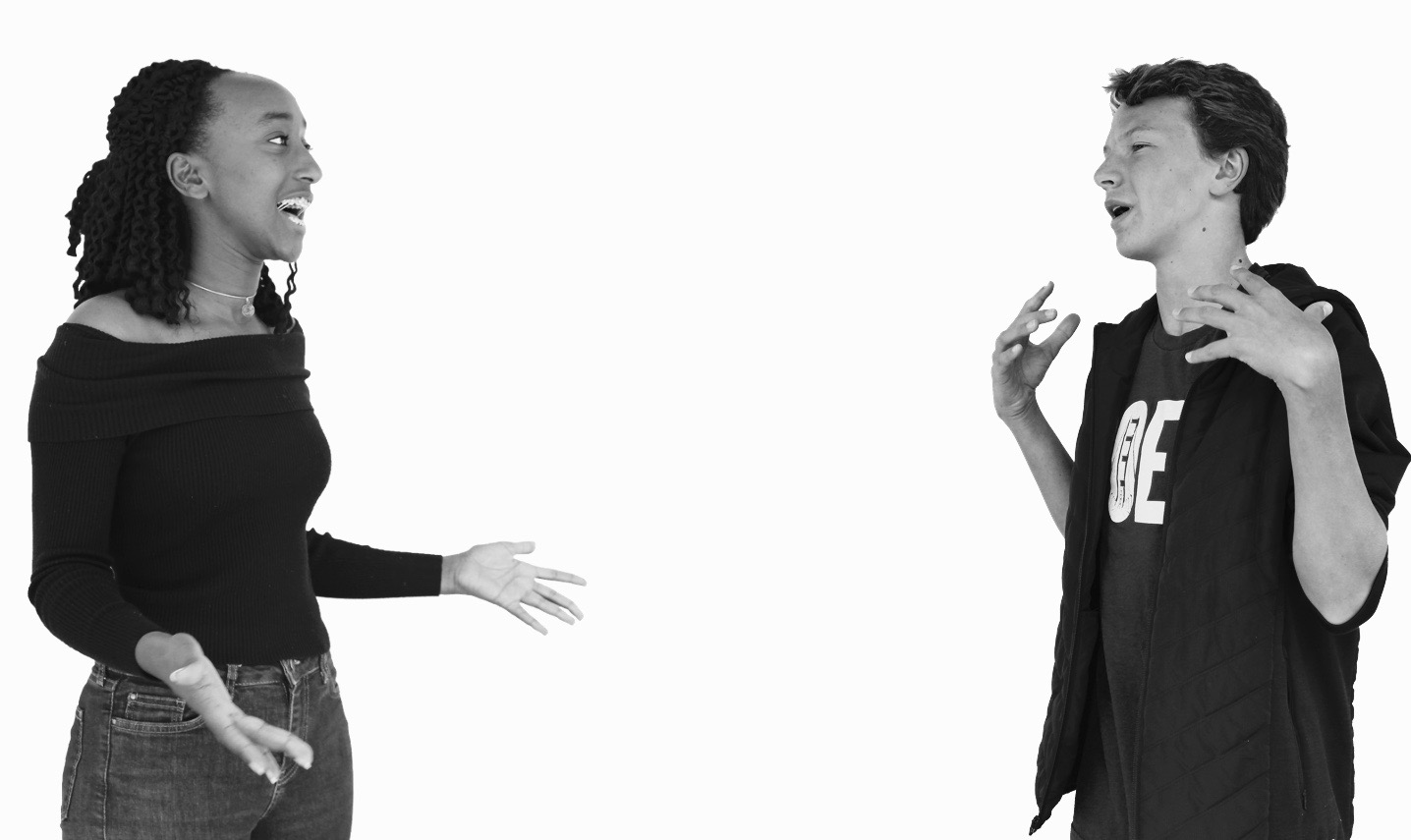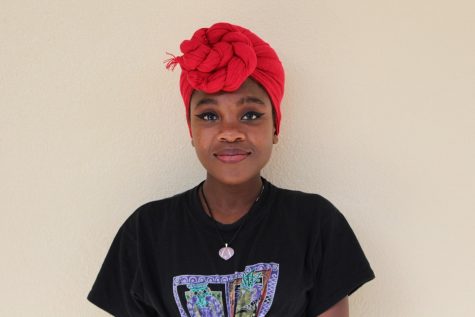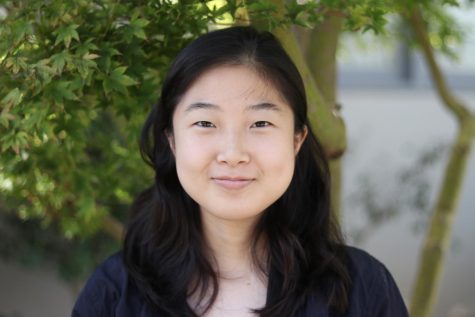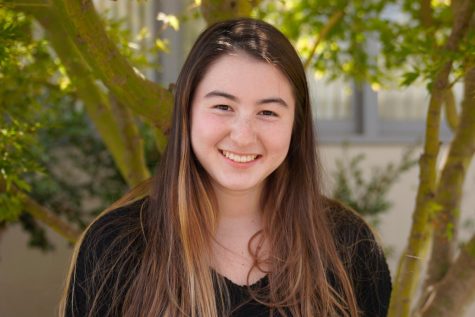UDPS and beyond: poetry at Los Altos
July 6, 2017
In the following interviews, edited for clarity, The Talon features two poets on the Los Altos Slam Team and their experiences and journeys with poetry. The team took home second place at the Youth Speaks Unified District Poetry Slam (UDPS) finals on April 26, an amazing feat after competing against 20 other high schools. All members of the team were brought together through the commonality of their love of slam poetry, practicing during lunch and after school to truly perfect their performances.
Makeda Yezalaleul
Over the last two years, sophomore Makeda Yezalaleul has been cultivating her interest in poetry. In her freshman year, she won the freshmen poetry slam, marking her spot on the local poetry scene. Last year, the Los Altos Slam Poetry Team was a wild card team in the Unified District Poetry Slam. During their call back in the finals, Makeda was asked to compete, which was her first experience on such a large stage. This year, the slam team took second place. Because of her experience she decided to officially join the poetry team, Divulgence.
Q: The poetry team asked you to join them last year during the UDPS finals. How was that experience?
A: I remember last finals I was freaked out of my mind because I hadn’t done this kind of stuff before, and I was a freshman but you can’t get in your mind. There’s so much good poetry there. You have to be able to get out of yourself to be there and appreciate all of it because it’s so good. You have to know you got this, and you’ve been preparing for this, you can do this and you should know that you can do this so you can appreciate everybody else’s pieces.
Q: What has been your poetry journey? Have you always enjoyed poetry?
A: I remember in eighth grade we did a poetry unit and I was like “Oh, this is cool. I could be good at this.” And then freshman year, I had Mr. Kwan and then we did a poetry unit. I was like “This stuff is really cool,” especially slam poetry because we didn’t focus on that in eighth grade. It speaks to people, and I love poetry that affects different people, even if it’s a poem about yourself and so I was like “This is so real. Why don’t I try something?”
Q: What was your writing process like?
A: I always have ideas in my head, just going on. I write them in my notes, but I have to be really compelled to write a piece of poetry. l piece things together, and sometimes I’m like “Can I really write a poem about this?” and then I just start writing and it keeps going. Poetry is a little nerve-wracking for me because I like writing poetry, but just performing poetry — I think getting in front of a crowd, but especially if it’s intimate and that kind of stuff like last year when we had to perform our poems that we wrote in class… It’s a really beautiful feeling, honestly, and it’s a feeling that makes me want to keep doing it over and over again.
Q: What was your poem about this year? Did you and your partner’s parts about religious experiences contrast each other?
A: I’ve had a strong religious upbringing and my partner Yalda hasn’t, but we’re still on the same topic of “God, are you there?” The thing we had in common was just believing in someone and questioning if that someone is following through. So we’re still both questioning things and our poem ended on a note where we ask, “Are you there? Can you help us? We want to try and understand you, so help us understand you.”
Q: From this experience what would you say about your community, the poetry team?
A: We don’t write about the same stuff, and I love how we don’t write about the same stuff because our broad variety of poems are so uniquely diverse. I like the whole process of editing someone’s work and sharing it and going through that. I also love seeing the before and after and how someone can get to really know their piece. I love how we support each other through this whole journey.
Q: Do you have anything to say to those who haven’t experienced this yet?
A: I honestly didn’t think that I would be doing poetry again this year because still just thinking about it, it just scares me at first. But once I entered UDPS, I was like, “This is why I love this, and this is why I’m going to keep loving it,” and I encourage anyone if you think you don’t, just try it and try to get to know it. I think it’s worth it.”
Adam Hollingworth
One of the newest and youngest members of the Los Altos Slam Poetry Team, freshman Adam Hollingworth is already making a name for himself in the world of poetry. Adam has participated in both the freshman poetry slam and in the UDPS finals, helping to secure second place for the team. Despite Adam’s past experiences with performing poetry in front of crowds and his Acting 1 class, this poetry slam was the first large scale poetry competition that he had participated in. He does not know what the future holds for his poetry, but he is sure that he will continue with the art in high school.
Q: How did you get into poetry?
A: I didn’t write poetry until eighth grade but I was always fascinated by it. I got into poetry because of my brother, Jim. He was always a big influence in my life, and he started to do poetry in ninth grade. It transformed from me watching slam poets online to actually doing it here in high school. There’s also this rapper/poet called Watsky, and he wrote a poem called “Drunk Text Message to God”, and a little bit of my work is influenced by that.
Q: How did your brother impact your poetry?
A: My brother is probably my biggest role model… When I went to the school-wide poetry slam that he was at in ninth grade, I thought it was so cool. Instantly, when I got home, I started brainstorming about how I might write a poem and what it would be about. It was really inspiring.
Q: Could you elaborate more on that relationship?
A: I think that when I’m writing poetry, I sort of subconsciously ask myself, “How would Jim do this?” “How can I make this better than Jim’s?” I ask him for help a lot, when I’m stuck or need a new concept — then I’ll ask him what he would do. I try to be better than him, but even so, he’s a great poet. If I can take some of his advice and put my own spin on it, that’s sort of how I can become better than him.
Q: How do you gain inspiration for your poems and implement your own style?
A: It’s like self-deprecation, but comedically. As a straight white male living in Los Altos, I don’t have any global struggle that I can talk about. Coming across as someone that has something to say is my favorite part about poetry. I see oppression in the news, and I want to say something about that, but it’s hard to write a poem that doesn’t come across as white guilt or cultural appropriation. That’s another challenge with the poetry team, because with having such a privileged background, it makes it hard to not come across as privileged.
Q: What is your poem “Brains and Broteins” about?
A: I had seen a lot of poems in my English class that were great, but they were all pretty depressing and very serious… but I’ve never been great with serious poems, so I decided to write a poem that had some message of not conforming to society’s norms of masculinity. It was more doing a fun poem that I liked and didn’t have to stress about, letting the audience feel good after the performance. I’ve always been more intellectual than athletic. I’ve never been oppressed, so talking about something like this which is more trivial and trivialized in my writing makes it easier to talk about these things but also convey this underlying message that I don’t conform to society’s views of masculinity.
Q: What was your experience working with the team?
A: Being on the team is really exciting for me. It’s something completely different and it’s a little scary stepping out of your little comfort zone thing, but it’s also good to experience these kinds of things. The first time was definitely scary, getting up on the stage and performing this personal kind of poetry stuff, but now that I’ve done it a couple of times, it feels really cool and I feel a lot more confident on stage.
Q: How is performing in front of an audience?
A: Going to perform in front of a crowd for the quarterfinals of the UDPS was scary. I mean, being on a low stage with the bright lights in your face, it’s not like you can actually see the audience. But even if you can’t see the audience, it’s still really unnerving knowing they’re there. It’s really cool being part of a group poem though, just because I have my teammates literally right next to me, and if I get nervous I can just remind myself that they’re there.




